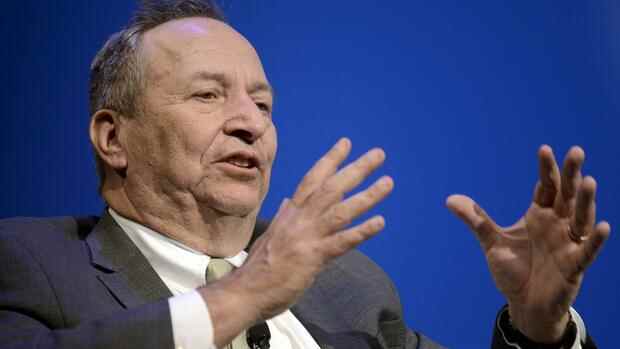Berlin The current inflation debate can be summed up with a bon mot from Kurt Tucholsky: “The people get most things wrong, but most of them feel right.” While economists argue about whether the current price increases are permanent or temporary, many people have theirs Opinion formed through their everyday experiences: Whether heating costs, filling tanks or groceries – the price curves for many goods and services are steadily pointing upwards.
The scholars’ argument nevertheless continues undeterred, and with the former US Treasury Secretary Larry Summers and the Nobel laureate in economics Paul Krugman, two economists from the heavyweight class have now climbed into the ring: While Krugman insists on the first part of Tucholsky’s popular wisdom, Summer got up early hit on the second side.
The exchange of blows is also interesting because both Krugman and Summers are politically part of the Democratic camp and have long campaigned for a more expansive fiscal policy. The fact that the two star economists are still fighting each other over the risk of inflation is also due to the fact that there has been a crunch between the progressive and moderate wing of the party for months.
While the Progressives, with the support of Krugman, are demanding massive government spending on the social and climate-friendly restructuring of the US economy, Summers and his supporters from the center of the party fear that the government of US President Joe Biden, especially with its stimulus package of almost two trillion dollars gave the economy a huge surge in inflation.
Top jobs of the day
Find the best jobs now and
be notified by email.
Krugman, however, is fighting more and more losing ground: Since the US Department of Labor announced last week the highest increase in consumer prices in more than 30 years with an increase of 6.2 percent, doubts have also grown among the Nobel laureate in economics: “I have myself in the Inflation got it wrong and didn’t see the current surge coming, ”Krugman tweeted. He did not think that the stimulus package, as prophesied by Summers and others, would trigger such a large surge in demand.
The risk of inflation could pave Trump’s way back to power
Krugman wouldn’t be the controversial icon of left-liberal America if he didn’t put a big “but” after his Mea Culpa. The professor who teaches at Princeton points out that real final demand in the USA has only increased by 2.6 percent in the past two years. Inflation is therefore less the result of excessive government spending than the result of global supply bottlenecks. “That doesn’t mean that inflation will necessarily be temporary, although I still think that’s the most likely scenario,” said Krugman.
Summers replied immediately: “Paul Krugman is continuing his efforts to downplay the risk of inflation for the American economy and progressive politics,” tweeted the no less controversial political economist just a few hours later. Summers is particularly annoyed that Krugman is comparing the pandemic and the price surge that followed with the post-World War II situation. “After the attack on Pearl Harbor you don’t ask: How big is the output gap?” Krugman accused his adversary in February.
“If this is the best argument (…) that someone who is as clever, rhetorically effective and committed as Paul, then my fear of inflation is even greater,” Summers countered the comparison with the war economy. The economic situation at that time is not comparable with the current situation. For him, a parallel with the 1970s, which heralded the beginning of global stagflation, is more fitting. According to Summers, this is also politically dangerous: “The excessive inflation and the feeling that it was not being controlled contributed to the election of Richard Nixon and Ronald Reagan and could bring Donald Trump back to power,” he warns.
Princeton economics professor Paul Krugman believes the price hike is only temporary.
(Photo: Reuters)
The dispute between the two economists is more than an academic skirmish between two right-wingers, but has great significance for further fiscal and monetary policy. The point is when and how much the US Federal Reserve should apply the brakes on monetary policy. “Raising interest rates too early could prove to be a big mistake as the Fed won’t have much room to cut rates if demand fades,” Krugman warned in his column in the New York Times.
Summers has a completely different opinion and compares the precarious situation with that of a car driver at the end of a traffic jam: “When you see in front of you that all traffic could come to a standstill, you start to brake as early as possible,” he warns and states: “That is the right way to think about the (inflation) problem of the central bank at the moment.”
An argument that has apparently also reached the US Federal Reserve in the meantime. Their latest inflation outlook stated that price pressures are “likely to be temporary”. In earlier statements, central bankers were still firmly convinced that inflation was largely caused by “temporary factors”.
In other words, it looks like Summers and Tucholsky are proved right.
More: Bankers urge the ECB to tackle inflation swiftly
